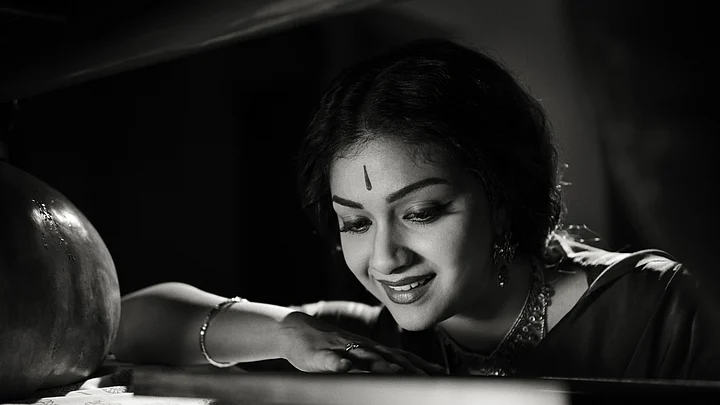Mahanati (Telugu) is a 177-minute-long – slow paced in parts – throwback into a bygone era in which Savitri comes across as pure white, unblemished, while Ganesan does not come out smelling of roses.
Too caught up to read? You can listen to the review here.
First the best part about Mahanati, which translates to ‘actress supreme’ – Keerthy Suresh as actress Savitri and Dulquer Salmaan as Gemini Ganesan.
With the film career of the two megastars as the backdrop, the film makes an attempt to explore the complex intricacies of their relationship – creditworthy given the fragile egos in filmdom where the personal lives of stars are largely left untouched.
For those unfamiliar with Savitri’s story, the girl from coastal Andhra clearly has been one of the most brilliant actors to emerge in south Indian cinema. She was the leading lady, for whose dates even top stars waited, in Telugu and Tamil cinema in the 1950s and 1960s.
Savitri had a meteoric rise and fall as well, passing away at the age of 45 in 1981, the last 19 months of her life in coma. She married Ganesan, knowing fully well that he was already married and was in a relationship with another woman.
But professional envy at not being able to match up to Savitri's success leads to schisms in their marital relationship. On the professional front, decisions to invest in poor quality cinematic ventures, cheated by people close to her, and a charitable nature leads Savitri to doom. She turns an alcoholic and finally collapses.
‘Mahanati’ is a Brave Effort at the Biopic Genre
Tollywood, barring the political-cum-crime ventures by Ramgopal Varma, has not ventured into biopics. So, in that sense, Mahanati is a brave effort. It brings to life an effervescent girl, who longs to know how her late father looked like, is so overawed by the thought of sharing screen space with Akkineni Nageswara Rao (played by his grandson Naga Chaitanya) that she goofs up the scene and cannot make sense of the praise Prithviraj Kapoor showers on her in Hindi.
In her pre-release interviews, Keerthy revealed that she had first refused the title role. While the narration tempted her, she was nervous about whether she would be able to play Savitri and the brickbats that would come if she made a hash of it. The anxiety made her prepare better and the manner in which she breathes Savitri in every frame shows the effort has been worth it. The make-up and the accessories complement Keerthy's acting as she plays the radiant beauty who straddled celluloid more than half a century ago.
The Power and Limitation of the Script
The challenge for biopics is how to go beyond looking like a Wikipedia page on reel. Director Nag Ashwin accomplishes this by making journalist Madhuravani (played by Samantha) the narrator of the story. In fact, Savitri and Vani's characters are similar in many senses, rebellious, looking to defy what society would like to stereotype women as.
If for Savitri it is to marry a much-married Ganesan against her family's wishes, for Vani it is to reject the arranged marriage match and finding love in photographer Anthony (Vijay Devarakonda) and even ensuring her moped starts on her first kick.
What Mahanati succeeds in doing is to humanise the reel Goddess. Keerthy brings to the fore Savitri's vulnerabilities, her stubborn nature, how sans make-up and off camera she yearned for the simple joys of life. It also highlights the warts in Ganesan's personality, his insecurity at his wife getting film offers opposite Sivaji Ganesan, an Abhimaan of sorts, and penchant for womanising.
However, the script is also the film's limitation. Vani discovers the story from Savitri's point of view, which means the thought process of Ganesan, who is the most critical person in her life contributing to her doom, is not explored enough. Given the tragic story of Savitri, it would have been only apt if the story had taken a deep dive into Ganesan's mindspace and explained why he did what he did.
The film will make old-timers nostalgic. Savitri's superhits like Devadasu in 1953 with ANR and Maya Bazaar in 1957 get ample screen time as they explain her ascent as an actor.
Mahanati is also a commentary on life beyond the arc lights. Savitri’s life is, in fact, a testimony to how letting her heart rule her mind led to wrong decisions that finally ended up taking her life at a young age. You can’t help but leave the theatre with a heavy heart.
(The Quint is now on WhatsApp. To receive handpicked stories on topics you care about, subscribe to our WhatsApp services. Just go to TheQuint.com/WhatsApp and hit send)
(At The Quint, we question everything. Play an active role in shaping our journalism by becoming a member today.)
